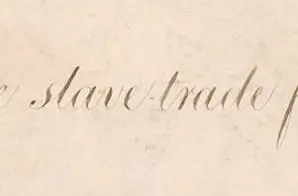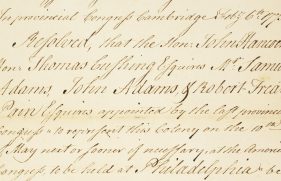Third Congress of the United States:
At the First Session,
Begun and held at the city of Philadelphia, in the state of Pennsylvania, on Monday, the second of December, one thousand seven hundred and ninety-three.
An Act to prohibit the carrying on the slave trade from the United States to any foreign place or country
Be it enacted by the Senate and House of Representatives of the United States of America in Congress assembled, That no citizen or citizens of the United States, or foreigner, or any other persons coming into, or residing within the same, shall, for himself or any other person whatsoever, either as master, factor or owner, build, fit, equip, load or otherwise prepare any ship or vessel, within any port or place of the said United States nor shall cause any ship or vessel to sail from any port or place within the same, for the purpose of carrying on any trade or traffic in slaves, to any foreign country; or for the purpose of procuring, from any foreign kingdom, place or country, the Inhabitant’ of such kingdom, place or country, to be transported to any foreign country, port, or place whatever, to be sold or disposed of, as slaves And if any ship or vessel shall be so fitted out, as aforesaid, for the said purposes, or shall be caused to sail, so as aforesaid, every such ship or vessel her tackle, furniture, apparel and other appurtenances, shall be forfeited to the United States; and shall be liable to be seized, prosecuted ant condemned, in any of the circuit courts, or district court for the district where the said ship or vessel may be found and seized..
And be it further enacted, That all and every person, so building, fitting out, equipping, loading, or otherwise preparing, or sending away, any ship or vessel, knowing or intending that the same shall be employed in such trade or business, contrary to the true intent and meaning of this act, or any ways aiding or abetting therein, shall severally forfeit and pay the sum of two thousand dollars, one moiety thereof to the use of the United States, and the other moiety thereof to the use of him or her who shall sue for and prosecute the same.
And be it further enacted, That the owner, master or factor of each and every foreign ship or vessel, clearing out for any of the coasts or kingdoms of Africa, or suspected to be intended for the slave trade, and the suspicion being declared to the officer of the customs, by any citizen, on oath or affirmation, and such information being to the satisfaction of the said officer, shall first give bond with sufficient sure ties, to the treasurer of the United States, that none of the natives of Africa, or any other foreign country or place, shall be taken on board the said ship or vessel, to be transported, or sold as slaves, in any other foreign port or place whatever, within nine months thereafter.
And be it further enacted, That if any citizen or citizens of the United States shall, contrary to the true intent and meaning of this act, take on board, receive or transport any such persons, as above described, in this act, for the purpose of selling them as slaves, as adores said, he or they shall forfeit and pay, for each and every person, so received on board, transported, or sold as aforesaid, the sum of two hundred dollars, to be recovered in any court of the United States pro per to try the same; the one moiety thereof to the use of the United States, and the other moiety to the use of such person or persons, who shall sue for and prosecute the same.
Frederick Augustus Muhlenberg Speaker of the House of Representatives
John Adams, Vice-President of the United States, and President of the Senate.
Approved
March the twenty Second 1794
G. Washington – President of the United States
I certify that this Act did originate in the
House of Representatives
John Beckley – Clerk.




